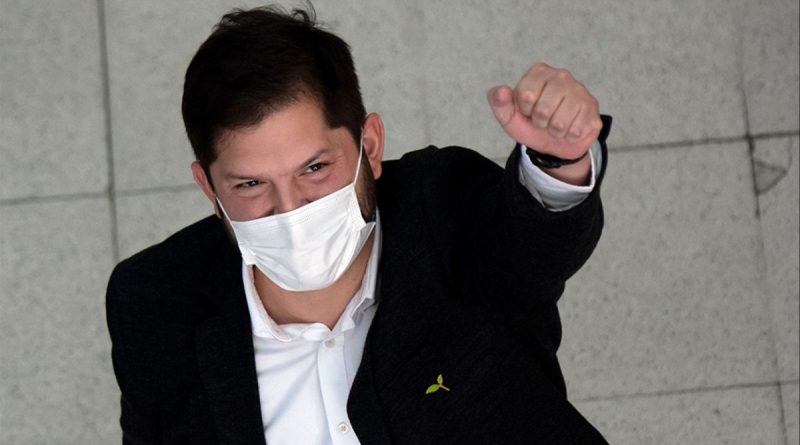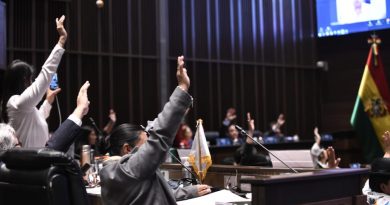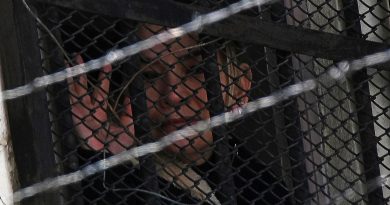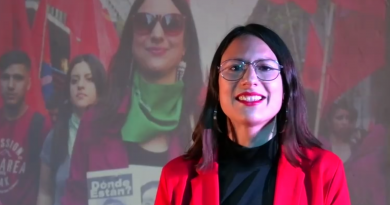Interview: What Can We Expect From Boric?
We spoke to Bruno Sommer, founder of El Ciudadano, one of Chile’s leading progressive media outlets. We discussed what Chile and the world can expect from Gabriel Boric and the broad movement that delivered Sunday’s landslide electoral victory.
I imagine there is still a sense of elation on the streets of Chile now!
Of course, the victory of Boric and his Frente Amplio group is not only a victory for their sector, but for all the social movements that came out to back him. This election was unique, it had the highest rate of participation since the ‘return to democracy’. Boric is the youngest President in history, 35 years old, and received more votes than any other president since the return of democracy. His 55.9% of the vote was 12 points higher than Kast, which gives the program of transformation a better chance at governability. There’s a sense of deep joy among the left, and serious anger among the right. Kast came out to concede defeat, but his supporters are, as we say in here; ‘con un aji en el trasero’ (with a chili pepper up their behind), that is to say, they are furious. This presents a number of opportunities for the future of our country.
Ideologically, Boric is a progressive, but the situation becomes more complicated when we see the array of different forces that form his electoral coalition. Who was part of this campaign?
I think it’s important to start with a look at how Boric comes into politics. His first prominent role was as President of the Federation of University Students of Chile, he succeeded Camila Vallejo (now a Communist Party lawmaker) in that position. After that, he becomes a congressman and within 10 years he becomes President of the republic. He becomes a presidential candidate after a primary election, between him, representing the Frente Amplio party, versus Daniel Jadue of the Communist Party. Boric wins and becomes the candidate of the electoral front representing these two groups. During the second round, when it’s just Boric versus Kast, the old traditional parties of the transition to democracy endorse Boric, they include; PPD, the Socialist Party (PS), and even the Christian Democrat Party who are a centrist group with some sections of it even identifying as center-right.
During this second-round campaign, his coalition of support became incredibly broad and that pushed Boric towards the center politically as he sought to consolidate this majority that would allow him to obtain the overwhelming victory we saw on Sunday. This has caused great concern among the social movements that support Boric, many do not want him to work with the centrists, but it was decided that this re-orientation towards the center was a necessary step to win and therefore enact the programs of change and transformation that the left wants to see. Without a doubt, this balancing act is going to cause a number of tensions, and we’ll see them burst out in the coming months.
Another important point to remember is that Boric in and of himself, his image and power, is not enough on its own. The composition of the legislature is such that there is a tie between the opposition and progressive forces, which is an enormous obstacle to change. So, how can Boric implement those transformations he promised? Through the constituent convention, the organ that was elected to draw up the new constitution. That is the space from where important transformations can be realized. The election of Boric is the guarantee that the constituent convention will be able to work and operate for the rest of the seven months they have left before they have to present the new constitution, which will then go to a referendum. If Kast had been elected, his first act would have been to find the mechanism through which to shut down that constituent process.
Do you think Boric will govern with the Communist Party? Or will he move to exclude them? They have had disagreements on issues such as Cuba and Venezuela.
I think Boric will respect the agreements he has with the Communist Party. Fundamentally, Boric is a candidate of both the Frente Amplio and the Communist Party. All the traditional parties only joined the campaign later on. Boric is the candidate of that original alliance of Frente Amplio-Communist Party. So yes, I think Boric will grant a space within government for the Communist Party, even though the centrist parts of his second-round coalition are opposed to that.
Furthermore, there was a ferocious anti-communist campaign here, Boric was labeled as a communist and attacked with all the straw man arguments that accompanies this anti-communist rhetoric in Chile. However, I think that all this narrative that’s laden with fake news has not cut through to the heart and mind of Gabriel Boric. I think he’ll provide the rightful spaces in government for the Communist Party. Beyond this current alliance, Boric himself is a close friend of and shares a generation of struggle with Camila Vallejo, with Karol Cariola. Those people are his close friends at a personal level, and they are two key members of the Communist Party. I’m sure that they will be made cabinet ministers, and I’m sure that other ministries will be led by members of the Communist Party. I can’t say how many! Perhaps three ministries will be in the hands of the Communist Party.
Bolivians were surprised to see the opposition candidate, Kast, concede defeat graciously. Here, we’re used to the opposition mobilizing violent groups and crying ‘fraud’ as a means of explaining their lack of electoral support. Will this democratic spirit continue? Or are we likely to see a campaign of destabilization from the opposition?
For the sake of my country, I sincerely hope that such a destabilization campaign does not come to pass. However, we must not be naive. The announcement by Kast was respectful and in the democratic spirit, but look at how on Monday, one day after Boric’s victory, our currency collapsed against the dollar, the stock market was plunged into chaos. Today, things have stabilized somewhat on that front, but I think that the destabilization attempts against the agenda of change will come in the form of economic asphyxiation.
I hope this doesn’t happen, but that economic war against the democratic government of Boric, if it happens, will come from within Chile rather than from outside. I don’t think that Europe will try to cut off capital flows to Chile, in fact, they will try to strengthen ties. Likewise, I’ve been told that Boric’s team has had meetings with figures of the finance sector in North America. So I think that if a destabilization campaign is launched, it will be led by capitalists within the country because some of them may have their interests affected by Boric’s agenda.
I hope we can resolve problems through democratic dialogue rather than through economic war and boycott, but we can’t be naive, we have to be ready for it. Chile’s leading capitalists not only control the banks but also the media, those private banks are the direct owners of the country’s mainstream media outlets, something which is not allowed in most countries around the world. I think it’s important that Boric has been building ties with alternative media outlets in Chile, because a battle for narrative will arise and Boric needs to be a visionary in this regard and support an effort to increase media plurality so that the public debate can be balanced and fair. We know what the position of the big media outlets will be. We know what interests they represent.
Boric stated in a previous interview that he would like to establish full diplomatic relations with Bolivia. Do you think Chileans are ready to engage with Bolivia in a meaningful way, despite the history of conflict between our two countries?
Inside Boric’s heart, I know that this commitment is there, that dream of Latin American unity. Despite the fact that he’s moderated his discourse with the aim of broadening his base of support for these elections. I think many Chileans also want this, but Boric will need to lead a process of education to unlearn everything we were taught as children about why we must be hostile to Bolivia, about the myth that Bolivia started the Pacific War in the 1800s, when in reality it was a war between foreign corporations that pushed our peoples into war. We have the task of writing a new official history of the Chilean people and I think Boric has a commitment to such a project.



